BLASTING INTO SPACE

A Long March-2D carrier rocket takes off from the Xichang Satellite Launch Center in southwest Chinas Sichuan Province on February 20. The rocket launched four new technology experiment satellites, which have entered the planned orbit and will be used mainly for a new Earth observation technology experiment.
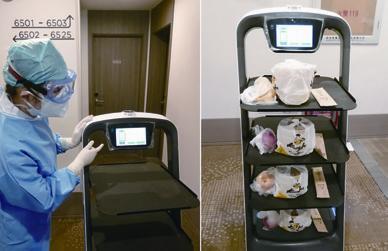
Hi-Tech Prevention
A medical worker uses a food delivery robot in Shenzhen, Guangdong Province in south China, on February 7. Hi-tech has been introduced in many cities in the prevention and control of the novel coronavirus.
Two Sessions Face Postponement
The annual sessions of Chinas top legislature, the National Peoples Congress (NPC), and the top political advisory body, the Chinese Peoples Political Consultative Conference(CPPCC), dubbed the Two Sessions, are likely to be postponed due to the current epidemic in China.
In December 2019, it was agreed that the NPCs annual gathering would start on March 5. Customarily, the CPPCC annual session starts on March 3.
However, the authorities are now mulling postponing the sessions as it is now at a crucial moment for the prevention and control of the coronavirus disease 2019(COVID-19) and the government has said no effort should be spared to ensure progress in this work.
Many national legislators and CPPCC members, especially those from the medical and health circles, are on the frontline fi ghting the epidemic.
NPC leaders, after careful deliberation, consider it necessary to delay this years plenary meeting, said Zang Tiewei, a spokesperson for the Legislative Affairs Commission of the NPC Standing Committee, on February 17.
The NPC Standing Committee will meet later this month to reach a decision on postponing the annual session.
The Chairpersons Council of the CPPCC also met on February 17, where it reviewed postponing the annual session. According to the CPPCC Charter, the CPPCC National Committee holds a plenary session once a year. To postpone it, the Chairpersons Council has to make a proposal.
COVID-19 Treatment
Based on the result of clinical trials, Chinese experts have confi rmed that Chloroquine phosphate, an antimalarial drug, has some curative effect on the novel coronavirus, a Chinese offi cial said on February 17.
The experts have unanimously suggested the drug be included in the next version of treatment guidelines and applied in wider clinical trials as soon as possible, Sun Yanrong, deputy head of the China National Center for Biotechnology Development under the Ministry of Science and Technology, said at a press conference.
Chloroquine phosphate, in use for more than 70 years, was selected from tens of thousands of existing drugs after multiple rounds of screening, Sun said.
The drug is under clinical trial in over 10 hospitals in Beijing, as well as in Guangdong Province in south China and Hunan Province in central China, and has shown fairly good effi cacy, according to Sun.
She gave the example of a 54-year-old patient in Beijing who was admitted to hospital four days after showing symptoms. After taking the drug for a week, all his health indicators improved.
So far, no obvious serious adverse reactions to the drug have been found among the over 100 patients enrolled for clinical trials, she said.
New Jet
A new model of a China-developed short-haul aircraft will make its maiden fl ight in the second half of the year, according to the developer.
Manufacturing of the Xinzhou-700 has resumed at a research base in Xian, capital of Shaanxi Province in northwest China, the Xian Aircraft Industry Company (XAC) said.
The turboprop aircraft is a newgeneration regional jet, notable for its more effective body design and advanced technology. It can carry up to 70 passengers.
“We are simultaneously assembling two Xinzhou-700s,” Yang Guorong, the chief manufacturing engineer for the project, said. “The aircraft to be used for the maiden fl ight is in the fi nal stages of assembly.”
So far, 285 orders have been received for the Xinzhou-700 from 11 domestic and foreign airlines.
XAC started developing the aircraft in 2013, with the aim of claiming a larger share of the global market.
BeiDou Satellites
Four satellites of the BeiDou Navigation Satellite System (BDS) have recently passed tests in orbit and started operation in the network, the Satellite Navigation System Management Offi ce said.
These are the 41st, 49th, 50th and 51st satellites of the BDS family.
The 41st satellite, launched on November 1, 2018, is operating in geostationary orbit, and the 49th satellite was sent into inclined geosynchronous Earth orbit on November 5, 2019. Both were developed by the China Academy of Space Technology.
The 50th and the 51st satellites, launched on November 23, 2019, are operating in medium Earth orbit. They were developed by the Innovation Academy for Microsatellites of the Chinese Academy of Sciences.
Over the past two years, 28 BDS-3 satellites and two BDS-2 satellites have been successfully sent into orbit.
Plans are underway to send two more BDS satellites into geostationary orbit in the fi rst half of the year to complete the global network.
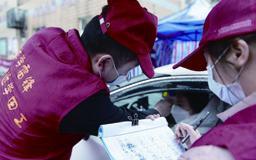
Voluntary Help
Volunteers take a drivers temperature at the entrance of a community in Changde, Hunan Province in central China, on February 15. Many young people are offering voluntary services to prevent and control the novel coronavirus in the city.
IOC Conference
The Beijing Organizing Committee for the 2022 Olympic and Paralympic Winter Games (BOCOG) held a high-level video conference with the International Olympic Committee(IOC) on the preparations for the Beijing 2022 Olympics Winter Games on February 17.
The video conference was attended by Beijings Vice Mayor and BOCOG Executive Vice President Zhang Jiandong, IOC Vice President and Chair of the Coordination Commission for Beijing 2022 Juan Antonio Samaranch Jr. and IOC Executive Director for Olympic Games Christophe Dubi.
They discussed global ticket sales, hospitality programs and the promotion of sustainable and legacy projects.
“Amid the Chinese peoples fi ght against the novel coronavirus epidemic, this video conference on preparations for the 2022 Games represents the understanding and support from the IOC,” Zhang said.
After the outbreak, IOC President Thomas Bach sent letters to the Chinese Olympic Committee, expressing his confi dence that the Games preparations will not be affected. Samaranch has praised Chinas effort to contain the epidemic and his confi dence in the victory of the efforts. The BOCOG has been in close communications with IOC offi cials, reporting important updates.
Fertilizer Supply
The central authorities said a steady supply of fertilizer will be ensured for spring farming.
Fertilizer enterprises are encouraged to resume production in a well-organized manner, according to a guideline released by 16 central departments, including the National Development and Reform Commission.
Priority will be given to ensuring a steady supply of the raw materials needed, including coal and natural gas, to increase fertilizer output for spring farming.
The guideline also underscored the need to ensure smooth transportation of fertilizer and urged strengthened coordination of fertilizer reserves and fertilizer imports.
Financial institutions are encouraged to increase credit support for fertilizer production and transportation enterprises. Hoarding and price gouging will be severely punished.
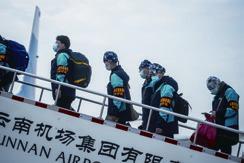
More Relief Personnel
Medical workers board a plane at an airport in Kunming, capital of Yunnan Province, southwest China, on February 15, as members of the fourth provincial medical team sent to Hubei Province, central China, to help combat COVID-19.
COVID-19 martyrs
Medical workers and other personnel who died fi ghting the novel coronavirus epidemic will be honored as martyrs.
According to a circular by the Ministry of Veterans Affairs and the Political Work Department of the Central Military Commission, the plan covers those who had direct contact with suspected or confi rmed cases and were infected with the virus while performing their duties, including diagnosis, treatment, nursing, infection control, specimen collection, pathogen detection and patient transfer.
Others who sacrifi ced their lives could also be recognized as martyrs if certain criteria are met.
The circular also stressed comforting and compensating the families of martyrs.
Support From Stock Exchange
The Shanghai Stock Exchange (SSE) stepped up efforts to support Chinas fi ght against the novel coronavirus epidemic.
The SSE encouraged enterprises in the fi eld of technological innovation related to epidemic prevention and control to be listed on the domestic sci-tech innovation board(STAR), according to a statement on its website.
Firms are encouraged to conduct roadshows through the Internet and phone calls, make timely adjustments to their offering schedules and hold listing ceremonies online, said the exchange.
Noting fi rms diffi culties in completing auditing work and disclosing their 2019 annual report and 2020 fi rst-quarter report on time amid the epidemic, the exchange postponed the disclosure of annual reports for more than 70 fi rms and extended the time limit on mergers and acquisitions.
The SSE also granted special support to Hubei Province, waiving initial listing costs and this years annual fee for companies from the region, as well as approving the fi rst exchange-traded fund supporting Hubeis infrastructure construction.
Enterprises from Hubei and other regions severely affected by the epidemic, as well as companies raising funds for epidemic control, are provided with direct fi nancing and a “green channel” for issuance review of corporate bonds and assetbacked securities.
Rising Leverage
The leverage ratio of Chinas real economy increased last year, according to a report released by the National Institution for Finance and Development.
The overall debt ratio of households, non-fi nancial enterprises and governments rose to 245.4 percent in 2019, up 6.1 percentage points from the previous year.
The rise followed a debt growth slowdown in 2017 and a leverage level drop in 2018. But the increase rate was much lower than that from 2008 to 2016, providing evidence that the country is determined to deleverage.
The pickup was mainly driven by the household debt ratio, which rose 3.7 percentage points year on year to 55.8 percent in 2019. The debt ratio of the Chinese Government increased 2.1 percentage points during the same period, the report said.
Meanwhile, the non-fi nancial enterprises debt ratio went up merely 0.3 percentage point, it said.
With looming downward pressures and the impact from the novel coronavirus outbreak, the report predicted Chinas leverage in the real economy would rise by 10 percentage points in 2020.
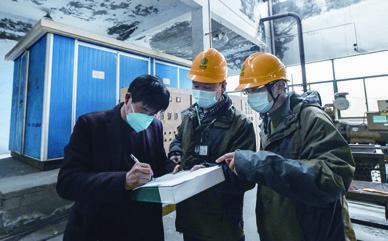
Strong Support
Two staff members from a local electricity company offer door-to-door service to an enterprise that has resumed work in Cixi, Zhejiang Province in east China, on February 15. The local government has taken a multitude of measures to encourage local enterprises to resume production and help address shortages of staff, facilities and funds. So far, more than 600 companies have restarted work in the city.
FDI Inflow
Foreign direct investment (FDI) into the Chinese mainland saw steady growth in January as authorities pledged better services and a better environment for foreign-funded enterprises, offi cial data showed on February 17.
The FDI expanded 4 percent year on year to 87.57 billion yuan($12.5 billion) in January, according to data from the Ministry of Commerce(MOFCOM). A total of 3,485 new foreign-funded enterprises were established during the period.
Foreign investment in hi-tech industries surged 27.9 percent year on year to 31.35 billion yuan ($4.4 billion), accounting for 35.8 percent of the total FDI. Infl ow to hi-tech manufacturing came in at 8.4 billion yuan ($1.2 billion), while that to hitech services surged 45.5 percent to 22.95 billion yuan ($3.2 billion), the data showed.
Investments from the Republic of Korea and Japan surged 157.1 percent and 50.2 percent, respectively, while those from countries participating in the Belt and Road increased 31.3 percent.
As China goes all out to contain the coronavirus outbreak, authorities have stressed efforts to help foreign-funded companies resume production and operation in an orderly manner.
A MOFCOM circular recently stressed support for large foreign investment projects, calling for coordinated efforts to solve diffi culties and minimize the impact of the epidemic.
Localities should further optimize online administrative services and actively facilitate the introduction of foreign investment and capital through online consultations and teleconferences, it said.
Boosting Foreign Trade
The General Administration of Customs issued 10 measures to support foreign trade enterprises to resume business on February 16, in a bid to limit the impact of the novel coronavirus on the economy.
The measures will increase support to ease the diffi culties of enterprises, including simplifying business registration and fi ling procedures.
The administration will speed up the inspection and release of imported production equipment and raw materials urgently needed by enterprises.
It will hasten the process of granting permission to agricultural products and food imports, shorten the length of time for quarantine examination and approval, and allow applications that meet the requirements to be submitted and approved at the same time.
It will also support enterprises to further expand exports, according to the administration.

Uninterrupted Work
Villagers pick vegetables for pickling in Fuling District, Chongqing Municipality in southwest China, on February 13. With proper epidemic prevention and control measures, Fuling has encouraged local enterprises and cooperatives to carry on production, a key driving force behind local economic growth, to ensure rural residents income.
Industrial Workforce
Chinas industrial workers in sectors like transportation and mining have been expanding rapidly since 2017, nearing 200 million, offi cial data showed.
The country is also home to about 170 million skilled workers, while highly-skilled workers amount to some 48 million, data from the All-China Federation of Trade Unions (ACFTU) showed.
China has taken measures to further cultivate its industrial workforce like hosting more than 60 professional skill competitions every year and expanding union membership, following the release of an offi cial reform plan in 2017.
The plan characterized industrial workers as a pillar for creating social wealth and innovation, as well as building China into a world manufacturing power.
The ACFTU helped fund 80 innovation projects for workers totaling 12.8 million yuan ($1.8 million) in 2017 and 2018, while apprenticeship programs led by the Ministry of Education cover 90,000 people each year.
Online Businesses
More online businesses are resuming work on Chinas e-commerce platform Taobao as the logistics sector continues to warm up, according to a report released by Alibaba on February 17.
Since February, more than 30,000 people have opened new stores on Taobao every day, with the number in the second week of February surging 22 percent compared to the previous one.
Guangdong, Zhejiang and Jiangsu provinces reported the largest number of new stores.
Statistics from Cainiao, Alibabas logistics arm, showed more than half of the couriers in China have returned to work based on the package collection and signing-in rates.
In Wuhan, the epicenter of the coronavirus outbreak, 400 delivery outlets have resumed operation. Previously, Cainiao and online shopping sites Taobao and Tmall had jointly set up a 1-billion-yuan ($143 million) fund to subsidize the supply chain and logistics.
According to Taobao, in the week, 4,000 factories, 500 properties on sale, 400 4S auto stores and 5,000 real estate consultants started selling through its livestreaming services.
Over 10,000 vegetable greenhouses across the country have been turned into livestreaming rooms, with farmers hosting broadcasts.
Affected by the epidemic, many agricultural products became unaccessible to consumers. E-commerce companies such as Alibaba and JD.com launched campaigns to facilitate sales online. From February 6 to 12, 12,000 tons of fruits and vegetables were sold through Alibabas campaign.
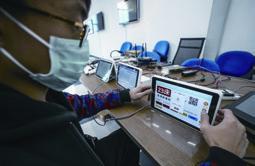
Tech Power
A worker tests an intercom system for communication between medical staff and patients at a technology company in Shenyang, Liaoning Province in northeast China, on February 14. Amid the outbreak of the novel coronavirus epidemic, Chinas hi-tech enterprises have facilitated medical treatment through smart products.

